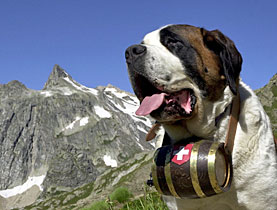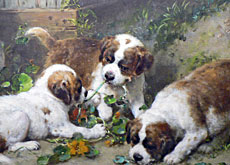Black drink saves from white death

Switzerland's St Bernard dogs, famous for finding and reviving avalanche victims with a tot of brandy, have been forced to adapt to the harsh economic climate.
From Wednesday the barrels round the necks of the Swiss Alpine Club’s 135 official mountain rescue dogs will be replaced by miniature Nespresso-style coffee machines.
“It was a purely business decision,” said Jörg Ettinghadt from the Swiss Alpine Club.
“The global financial crisis has meant we’ve got to either cut back the number of dogs or find some extra money. Using the Desperesso machines and the sponsorship money means we won’t have to reduce the dogs.”
Ettinghadt told swissinfo that the 3kg appliances work on the same “capsule” principle as the best-selling high-street models but with a few practical alterations.
“Every second counts when it comes to surviving an avalanche – the chances of survival have been estimated at 85 per cent within 15 minutes, 50 per cent within 30 minutes and 20 per cent within one hour. A warming drink – be it brandy or coffee – can make all the difference,” he said.
“However, the last thing you want to have to do with frostbitten fingers is fiddle around with aluminium capsules.”
To solve that problem, all Desperesso machines are fitted with three accessible buttons: espresso, black and decaf.
“The manufacturers also wanted to include a cappuccino option, but in trials we had problems with the wind and it looked as though the dogs were rabid,” he added. “And frankly although avalanche survivors might have limited options, you’d think twice before attracting a 100kg St Bernard foaming at the mouth.”
Critics
The Swiss army began training St Bernards to trace avalanche victims during the Second World War and in 1945 the Swiss Alpine Club took over specialised canine rescue training.
Ettinghadt says he has already been criticised by traditionalists angry at what they see as yet another aspect of Swiss culture being chipped away by globalisation. However, he hopes that once the dogs are in action and saving lives, people might change their mind.
“We were thinking of an advertising campaign along the lines of ‘Hypothermia – what else?’ but we weren’t quite sure of the legal situation,” he said, referring to Nespresso’s campaign featuring George Clooney.
He also points out that the old-fashioned barrels weren’t without problems.
“You’ve got to bear in mind that not everyone drinks brandy,” he said. “Doctors advise against giving 40 per cent alcohol to children and some people used to turn it down for religious or moral reasons.”
While Ettinghadt admits to having had initial doubts about “selling out”, he says he has been convinced of the new technology’s benefits.
“Last month we went out to celebrate [the Desperesso contract] and I woke up the next morning in a terrible way,” he said. “I then remembered that I’d left Urs [his St Bernard] next door still wearing his coffee machine. I didn’t even have to get out of bed!”
[Note: this article was published on April 1…]
The Swiss Alpine Rescue service is in charge of rescue operations for people in the Alps and is manned by volunteers. It has been saving people for more than a century, but started at first by saving its own members, before expanding to become an organisation covering all the country.
The service depends on contributions from supporters and the cantons where it operates for its funding.
The canton of Valais decided to form its own rescue service in the 1990s, and opted to merge all emergency services, apart from police, so they could be contactable on one main number.
There are 135 dog teams run by the Swiss Alpine Rescue service, including five women dog handlers. There are 35 people in training and there were 16 new recruits last year. There are around another 25 dog rescue teams in the French-speaking part of Valais and more in the Upper Valais.

In compliance with the JTI standards
More: SWI swissinfo.ch certified by the Journalism Trust Initiative












You can find an overview of ongoing debates with our journalists here . Please join us!
If you want to start a conversation about a topic raised in this article or want to report factual errors, email us at english@swissinfo.ch.